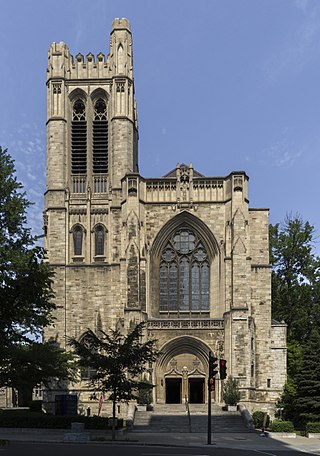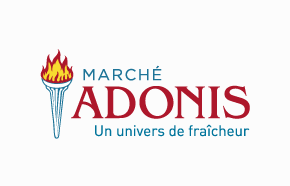
The Church of Saint Andrew and St Paul is a Presbyterian church in downtown Montreal, Quebec, Canada. It is located at 3415 Redpath Street, on the corner of Sherbrooke Street. It is in close proximity to the Golden Square Mile, the Montreal Museum of Fine Arts, Concordia University as well as the Guy-Concordia Metro station.

Chinatown in Montreal is located in the area of De la Gauchetière Street in Montreal. The neighbourhood contains many Asian restaurants, food markets, and convenience stores as well being home to many of Montreal's East Asian community centres, such as the Montreal Chinese Hospital and the Montreal Chinese Community and Cultural Centre.

Saint Laurent Boulevard, also known as Saint Lawrence Boulevard, is a major street in Montreal, Quebec, Canada. A commercial artery and cultural heritage site, the street runs north–south through the near-centre of city and is nicknamed The Main, which is the abbreviation for "Main Street".

Sainte-Catherine Street is the primary commercial artery of Downtown Montreal, Quebec, Canada. It crosses the central business district from west to east, beginning at the corner of Claremont Avenue and de Maisonneuve Boulevard in Westmount, and ending at the Grace Dart Extended Care Centre by Assomption metro station, where it folds back into Notre-Dame Street. It also traverses Ville-Marie, passing just east of Viau in Mercier–Hochelaga-Maisonneuve. The street is 11.2 km long, and considered the backbone of Downtown Montreal.

Saint-Laurent is a borough of the city of Montreal, Canada, located in the northern part of the island. Although it is no longer an independent city, it is still commonly known as Ville Saint-Laurent or by its initials, VSL.

J. Pascal's Hardware and Furniture was a Montreal, Quebec, Canada-based chain of hardware and furniture stores.

Mile End is a neighbourhood and municipal electoral district in the city of Montreal, Quebec, Canada. It is located in the city’s Plateau-Mont-Royal borough.
Montreal was referred to as "Canada's Cultural Capital" by Monocle Magazine. The city is Canada's centre for French-language television productions, radio, theatre, film, multimedia, and print publishing. The Quartier Latin is a neighbourhood crowded with cafés animated by this literary and musical activity. Montreal's many cultural communities have given it a distinct local culture.

The ALDO Group branded as ALDO, is a Canadian multinational corporation retailer that owns and operates a worldwide chain of shoe and accessories stores. The company was founded by Aldo Bensadoun in Montreal, Quebec, in 1972, where its corporate headquarters based in the Montreal borough of Saint-Laurent, Quebec, remain. It has grown to become a worldwide corporation, with nearly 3,000 stores across 100 countries, under three retail banners: ALDO, Call It Spring/Spring and GLOBO. Stores in Canada, the U.S., the U.K., and Ireland are owned by the Group, while international stores are franchised. The company once operated the now closed or rebranded banners Little Burgundy, Simard & Voyer, Christian Shoes, Access, Pegabo, Transit, Stoneridge, Locale, Feetfirst and FIRST.
Albert Nerenberg is a Canadian independent filmmaker, actor, journalist, hypnotist, and laughologist. His films include Stupidity (2003), Escape to Canada (2005), Let's All Hate Toronto (2007), Laughology (2009), Boredom (2012) and You Are What You Act (2018). Both Stupidity and Laughology are the first feature-length documentaries to discuss the topics of stupidity and laughter.

Quartier des Spectacles is an arts and entertainment district located in the eastern section of Downtown Montreal, designed as a centre for Montreal's cultural events and festivals. The Quartier des spectacles is a member of the Global Cultural Districts Network.

Fairmount Bagel is a Montreal-style bagel bakery in Montreal, Quebec, Canada in the Mile End neighbourhood of the Plateau-Mont-Royal borough. The first location opened on September 7, 1919 on Saint-Laurent Boulevard by Isadore Shlafman. The current location, on 74 Fairmount Avenue West was opened in 1949. Fairmount Bagel remains a family-run business.

The Monument-National is an historic Canadian theatre located at 1182 Saint Laurent Boulevard in Montreal, Quebec. With a capacity of over 1,600 seats, the venue was erected between 1891 and 1894 and was originally the cultural centre of the Saint-Jean-Baptiste Society.

Moishe's Steakhouse, in its original incarnation, was one of the oldest restaurants in Montreal, Quebec, Canada. Founded in 1938 by Moishe Lighter, it ran in Montreal's The Main district for 83 years. The restaurant had been in its location at 3961 Saint Laurent Boulevard since its founding, in an area that was the historic Jewish quarter.
This is a list of small shopping centres in the island of Montreal.
The Autorité régionale de transport métropolitain is an umbrella organization that manages and integrates road transport and public transport in Greater Montreal in Quebec, Canada. The organization was created by the Government of Quebec on June 1, 2017, replacing the former planning mandate of the Agence métropolitaine de transport (AMT). It has assumed other key initiatives including Opus card operation and multiple other projects supporting transit.

Marché Adonis is a supermarket chain operating in the Canadian provinces of Quebec and Ontario. The company is based in Montreal, Quebec. In 2011, Metro Inc. acquired a majority stake (55.5%) in Marché Adonis.
Pascal Maeder is a Swiss-Canadian film producer and cyberneticist.

Librairie L'Androgyne was an gay, lesbian, feminist bookstore in Montreal, Quebec, Canada, active from 1973 to 2002.
Les Compagnons de Saint-Laurent was a theatre company that was founded in August 1937 at Collège de Saint-Laurent in Saint-Laurent, Quebec, by Émile Legault, Roger Varin, and Léonide Lavinge. According to The Canadian Encyclopedia it was the "[...] most influential theatrical company in the history of Québec". The company dissolved in 1951.

















